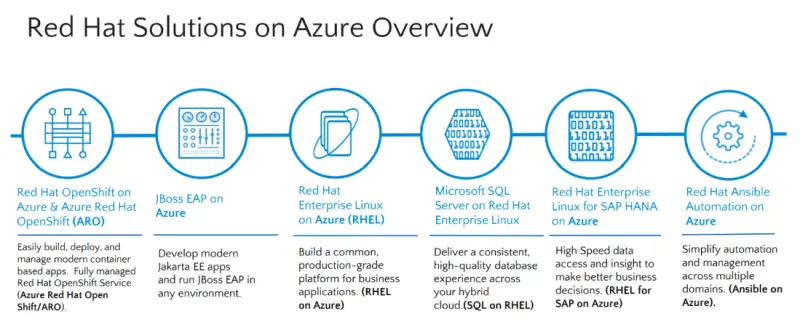Microsoft Azure is one of the leading cloud computing platforms in the world, offering a wide range of services that help businesses of all sizes to achieve their goals. One of the key strengths of Azure is its ability to integrate with other technologies and platforms, allowing customers to build powerful solutions that leverage the strengths of multiple tools. One such example is the collaboration between Microsoft and Red Hat, which has resulted in the development of innovative and powerful hybrid cloud solutions available today.
Since 2015, Microsoft and Red Hat have remained committed to delivering solutions that combine the strengths of open source with Microsoft Azure to provide customers with a more seamless and comprehensive hybrid cloud experience. With Red Hat’s expertise in open source technologies and Microsoft’s vast cloud computing capabilities, the collaboration offers customers the best of both worlds.
A great example of this collaboration is Azure Red Hat OpenShift, a fully managed application platform that combines the power of Microsoft Azure with the flexibility of Red Hat OpenShift. Jointly developed and supported by Microsoft and Red Hat, it allows developers to quickly build, deploy, and scale applications without having to worry about the underlying infrastructure. Users can take advantage of familiar Red Hat OpenShift and Azure tools and processes as well as built-in security features, continuous integration and delivery (CI/CD) pipelines, and a wide range of open source tools and technologies. As of February 2023, Azure Red Hat OpenShift is also generally available for Azure Government, providing government agencies with a secure and compliant option for running containerized workloads at production scale.
Another offering that has been developed as part of the Microsoft and Red Hat collaboration is the availability of Red Hat Ansible Automation Platform as a fully supported offering on Azure Marketplace. Ansible Automation Platform is an industry-leading open source automation platform that allows customers to automate their IT infrastructure and streamline processes. Ansible Automation Platform can be used to automate repetitive tasks, such as server provisioning, application deployment, and configuration management, and allows customers to deploy and manage applications on Azure with ease. The platform also enables customers to create a hybrid cloud infrastructure by automating the deployment of applications across both on-premises and Azure environments.
Red Hat Enterprise Linux is another key solution that has been developed as a security-enhanced and scalable platform that is optimized for enterprise workloads. By deploying Red Hat Enterprise Linux on Azure, customers can take advantage of Azure’s vast range of services, such as storage, networking, and security, while also leveraging Red Hat’s security features, such as SELinux. Azure Hybrid Benefit is a licensing offer that helps you migrate and save to Azure. It can be applied to existing Red Hat Enterprise Linux subscription and offers seamless bidirectional conversion from Pay As You Go (PAYG) to Bring Your Own Subscription (BYOS) type licensing model. Customers may see savings estimated to up to 76% with Azure Hybrid Benefit for Linux.
In addition, Red Hat JBoss Enterprise Application Platform (JBoss EAP), a highly secure, performant, and scalable platform for hosting Java EE/Jakarta EE applications, is available to customers via three hosting options for JBoss EAP on Azure: Azure App Service, Azure Red Hat OpenShift , and Azure Virtual Machines (VMs) / VM Scale Sets. All three solutions are jointly developed and supported by Red Hat and Microsoft.

Microsoft and Red Hat provide customers with support and consulting services to help them navigate their hybrid cloud journey. Red Hat’s expertise in open source technologies and hybrid cloud deployments can help customers make informed decisions and achieve their business goals.
By combining the strengths of both Microsoft Azure and Red Hat’s open hybrid cloud portfolio, customers can take advantage of a more seamless and comprehensive hybrid cloud experience that offers improved scalability, agility, and security capabilities. Whether customers are looking to modernize their existing applications or build new ones, the solutions developed as part of this partnership provide a powerful and flexible path to hybrid cloud that can meet the needs of any business. With ongoing support and consulting services available, customers can rest assured that they will receive the assistance they need to achieve their goals.
Learn more
- Visit the Microsoft Red Hat on Azure page to learn more about our offerings.
- Details about Azure Hybrid Benefit for Linux can be found here
- Join us at Red Hat Summit! #Booth222
关于作者
Garima Singh is a product marketer focused on helping technology partners grow their businesses on Azure. She leads partner and field strategy for Linux in the Azure infrastructure marketing team. Her career began as an engineer and quickly progressed through business development in Microsoft to gain more insight into customers, partners and the inner workings of a business, curating sales enablement, and Go-To-Market strategies. She holds an MBA degree from the National University of Singapore. When not working behind a laptop she enjoys traveling, reading and dancing.
Nate Ceres is a Product Marketing Manager at Microsoft, where he is responsible for driving the adoption and success of Java on Azure. He helps customers modernize their applications and take advantage of Microsoft’s end-to-end capabilities for building and running Java apps. Before joining Microsoft, Nate worked at VMware and IBM, where he held various roles in product marketing and sales enablement. With over a decade of experience in the technology industry, Nate is passionate about helping customers achieve their business goals through technology.
